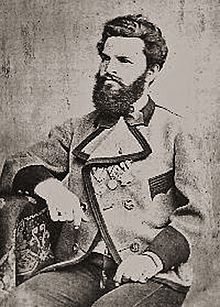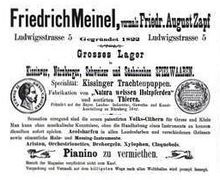Friedrich Meinel
Friedrich Meinel (* in Klingenthal , Saxony ; † June 7, 1911 in Bad Kissingen ) was a German toy manufacturer and mail order company operating worldwide .
Life
Meinel's ancestors were clapboard makers , lace traders, and miners . Several instrument makers such as the violin maker Christian Friedrich Meinel (1705–1774) were among them, which is where Friedrich Meinel's love for instrument making came from. In any case, after he had moved to Bad Kissingen in 1877, he opened the "Klingenthaler Musik-Instrumenten-Niederlage, Export en wholesale & en detail " at Ludwigstrasse 5 .
In the same year (1877) Meinel married Antonie Zapf , the daughter of the Bayreuth master turner Friedrich August Zapf , who had lived in the spa town since 1836. The royal Bavarian “ Weltbad ” with its high-ranking guests from all over Europe was a magnet for many enterprising entrepreneurs. Zapf traded in wooden and haberdashery goods and had built his new shop in Ludwigstrasse in 1874, which he now handed over to his son-in-law.
Meinel was obviously an extremely active and imaginative businessman. Immediately after the takeover, he enlarged the business premises. At the same time he founded a wood carving school in Sandberg ( Rhön ) . As early as May 1877, the Bad Kissinger Saale-Zeitung had published a series of articles entitled “Proposals for raising industry and agriculture in the Vorder-Rhön ” , which may have been the trigger for Meinel to get involved in the impoverished Rhön. After all, he himself came from the Ore Mountains, an area in which the need was just as great at that time due to the decline in ore mining .
Only five years after founding his wood carving school in Sandberg, Meinel was awarded a large bronze medal in 1882 at the 1st Bavarian State Industrial Trade and Art Exhibition in Nuremberg for "a rich collection of prize-worthy horses carved in wood intended for toys" .
His wife Antonie died in 1886 after only nine years of marriage, leaving behind two children aged seven and eight.
At that time Meinel was still trading in musical instruments, but since his success in Nuremberg, his commercial interest has evidently focused more on toy manufacturing and trading. In large-format advertisements, he drew attention to his “large stock of Kissinger, Nuremberg, Swiss and Saxon toys” . As his specialty he called "Kissinger costume dolls" and referred to the manufacture of "Natura white wooden horses and assorted animals" . He also offered his “ Volks-Cithern for young and old” and other “wood and brass instruments” such as aristons , orchestrionettes , xylophones , claquebois (a kind of xylophone) and pianinos , which he also rented , in smaller text .
In 1888 he took part with his toys at the world exhibition announced as the "International Competition for Science and Industry in Brussels " with products from his Sandberg wood carving school.
Meinel already advertised the Christmas exhibition of the same year in Bad Kissingen with the illustration of the silver medal he won in Brussels. The sale of toys to the international spa guests in Bad Kissingen, who at that time often spent the summer with their children in what was then the "Weltbad", seems to have been quite good in those years, because the oldest and most famous toys opened in the same season -Shipping business in Germany, A. Wahnschaffe from Nuremberg, a branch in Bad Kissingen. Even Karl Hassloch and C. Witzel offered games and haberdashery in the spa town.
Recently, Friedrich Meinel also recommended “ strollers , from the most vulgar to the finest, children 's chairs and safety triumphant chairs at factory prices” . In 1889 he enlarged his storage and cellar rooms in Turmgasse .
Meinel did not only trade in its wooden toys in Bad Kissingen. The toy wholesaler Adolf Fleischmann (1819–1895) in the then "world toy city " Sonneberg also had them on offer. In a contemporary description of his model room, "the white, very nicely modeled horses from the Rhön" were particularly emphasized.
After four years of widower, Meinel married Lina Schachenmayer in 1890 . A year later (1891) a daughter and a son in 1895 were born. In the meantime, Meinel was already advertising with multilingual advertisements and presented himself as the “holder of the Silver Medal for the King. Saxon Order of Merit ” and owner of a “ Manufactory of fine dressed music-dolls and fancy goods of every kind ” . The "dispatch to all parts of the world" was carried out according to the text of the advertisement "promptly and cheaply" .
A few years later, Friedrich Meinel's wooden and pipe toys from Sandberger won a silver medal in Nuremberg in 1896 and one in Leipzig in 1897 . Meinel meanwhile employed the entire community of Sandberg, which exclusively produced animal figures for him. In homework families took over the saddles and Schirren the wooden horses.
Meinel himself wrote in 1897 for the annual report of the Würzburg Chamber of Commerce and Industry : “The Kissingen pipe and wood goods industry is assuming more important dimensions from year to year, and these products are going to all parts of the world. The workers have a good income and work all year round, the blessing of this industry is quite palpable and many families consider themselves lucky to have found such a source of income, but the founder of this industry cannot repeat his request often enough that the extermination of aspen wood and that new planting should be taken care of, especially in the state forests of Kissingen, Aschach , Steinach , Premich , Schmalwasser and Sandberg. The petitioner does not make the request for himself, but for the following generations, so that one day the toy industry in Kissingen can flourish as well as in Sonneberg in Thuringia . "
Meinels call that Espen again reforest was founded: Sandberger district was Forestry Administration now gone over to the aspen and linden stocks by more easily salable spruce and fir trees to replace.
In 1906 Meinels Sandberger Spielwaren became the third and last big Bayer. State industrial trade and art exhibition in Nuremberg with “very good” and a silver medal for “lifelike and tasteful execution of the products as well as for enhancing this branch of industry in the Rhön region” . As a novelty he now offered "wooden vehicles with spring drive " and "real English lawn tennis utensils and great fishing equipment" .
On June 7, 1911 Meinel died surprisingly "after a short period of serious suffering" . The Sandberg wood carvers, who had long been economically dependent on Meinel, were now unemployed, had to change their range of carvings and sell their products themselves again.
In the year her husband died, Lina Meinel divided the business into three individual shops and continued to run the business for a short time. In January 1912 the last catalog of the "Friedrich Meinel Wood and Tube Toy Factory" was published.
Since business was not resumed after the First World War , Friedrich Meinel and the Rhön's short wood-carving tradition fell into oblivion. Examples of his toy production have been shown in the Bad Kissingen toy world permanent exhibition since 2012 .
As a citizen of Bad Kissingen, Meinel was involved in the volunteer medical column and the volunteer fire brigade and was a member of the Protestant church council. He was the bearer of numerous orders and medals .
literature
- Hilla Schütze: Friedrich Meinel and the white horses from Sandberg ( online )
Individual evidence
- ↑ The wooden horses were thus still unmounted and unpainted. They are the then known "white horses from the Rhön".
- ↑ Johann Gottfried Walther : Musical Lexicon [...]. Wolffgang Deer, Leipzig 1732, p. 168: "[...] one made of 7 sticks of wood, the latter five times smaller than the first existing percussion instrument [...]"
- ↑ The Saale-Zeitung wrote on April 22nd, 1888: “Today we had the opportunity to view the exhibits of Mr. Meinel in his shop and were amazed at the real artistic sense betraying wooden animals (domestic and wild animals), which are sent as toys . As a specialty, the carving school in Sandberg produces white Natura wooden horses in all sizes, which are characterized by their natural noble posture and the variety of positions and are equipped with pretty patent leather straps. We also liked quite nice carved shepherds with expressive faces. Mr. Meinel supplied the exhibition with around 20 dozen figures, which presented themselves very favorably on an elegant rack. Let's hope that German industry will also receive the award it deserves in Brussels. ” Meinel won a silver medal.
- ↑ The Saale-Zeitung wrote before the exhibition starts on February 24, 1896: "Yesterday we had the opportunity to visit the certain for Nuremberg exhibition of Mr. Friedrich Meinel. It gives an overview of the entire Rhön industry of this company and is a lovely sight. Hundreds of natural white wooden horses, faithfully recreated from life, from the smallest to the largest, can be seen on a large shelf, some of them nicely saddled and harnessed. In addition, lambs and wolves, elephants and camels, cats, lions and dogs etc. live peacefully together. The whole thing is crowned by a soaring eagle. The visitor also sees splendid specimens of the pipe industry in front of him, such as a gala sleigh with a gallon servant in the back seat, a luxury car modeled after the equipages of King Ludwig II , a car that wandering artists carry with them, etc. that of Mr. Meinel 1877 Established industry has become a blessing for the poor Rhön, more than 30 workers, including numerous family fathers, are permanently employed, partly in the factory in Sandberg, partly in the house industry in Sandberg, Premich etc., the Steinaspe, the "Linde der Rhön "(today: aspen or aspen); they are ideal woods for expressing nervous, natural life in brittle materials. F. Meinel's white wooden horses have carried the reputation of the Rhön region to distant worlds. Next to America and England , China is an important source of sales for this specialty. May the active manufacturer not lack success at the upcoming exhibition, as he was recognized in Brussels in 1882 and 1888. "
- ↑ To this end, it says in a text (without citing the source): "Hall 16 is decorated with large pictures of Aschaffenburg and Kissingen ... To the left of the main entrance, a large cupboard for the delight of young people as a pure Noah's Ark contains wooden animals in various sizes, made in the wood carving school Sandberg vd Rhön founded by the exhibitor F. Meinel, Kissingen in 1877; they delight the eye through the expression of lively movement, as well as through their mostly well-done characteristics. "
| personal data | |
|---|---|
| SURNAME | Meinel, Friedrich |
| BRIEF DESCRIPTION | German toy manufacturer |
| DATE OF BIRTH | before 1877 |
| PLACE OF BIRTH | Klingenthal |
| DATE OF DEATH | June 7, 1911 |
| Place of death | Bad Kissingen |

